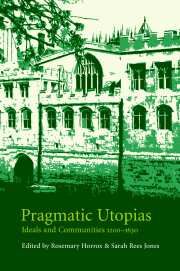Book contents
- Frontmatter
- Contents
- Preface
- List of abbreviations
- Richard Barrie Dobson: an appreciation
- 1 ‘If heaven be on this earth, it is in cloister or in school’: the monastic ideal in later medieval English literature
- 2 The ‘Chariot of Aminadab’ and the Yorkshire priory of Swine
- 3 Godliness and good learning: ideals and imagination in medieval university and college foundations
- 4 Hugh of Balsham, bishop of Ely 1256/7–1286
- 5 A cruel necessity? Christ's and St John's, two Cambridge refoundations
- 6 Coventry's ‘Lollard’ programme of 1492 and the making of Utopia
- 7 Thomas More's Utopia and medieval London
- 8 Social exclusivity or justice for all? Access to justice in fourteenth-century England
- 9 Idealising criminality: Robin Hood in the fifteenth century
- 10 Fat Christian and Old Peter: ideals and compromises among the medieval Waldensians
- 11 Imageless devotion: what kind of an ideal?
- 12 An English anchorite: the making, unmaking and remaking of Christine Carpenter
- 13 Victorian values in fifteenth-century England: the Ewelme almshouse statutes
- 14 Puritanism and the poor
- 15 Realising a utopian dream: the transformation of the clergy in the diocese of York, 1500–1630
- Bibliography of Barrie Dobson's published works
- Index
1 - ‘If heaven be on this earth, it is in cloister or in school’: the monastic ideal in later medieval English literature
Published online by Cambridge University Press: 01 July 2009
- Frontmatter
- Contents
- Preface
- List of abbreviations
- Richard Barrie Dobson: an appreciation
- 1 ‘If heaven be on this earth, it is in cloister or in school’: the monastic ideal in later medieval English literature
- 2 The ‘Chariot of Aminadab’ and the Yorkshire priory of Swine
- 3 Godliness and good learning: ideals and imagination in medieval university and college foundations
- 4 Hugh of Balsham, bishop of Ely 1256/7–1286
- 5 A cruel necessity? Christ's and St John's, two Cambridge refoundations
- 6 Coventry's ‘Lollard’ programme of 1492 and the making of Utopia
- 7 Thomas More's Utopia and medieval London
- 8 Social exclusivity or justice for all? Access to justice in fourteenth-century England
- 9 Idealising criminality: Robin Hood in the fifteenth century
- 10 Fat Christian and Old Peter: ideals and compromises among the medieval Waldensians
- 11 Imageless devotion: what kind of an ideal?
- 12 An English anchorite: the making, unmaking and remaking of Christine Carpenter
- 13 Victorian values in fifteenth-century England: the Ewelme almshouse statutes
- 14 Puritanism and the poor
- 15 Realising a utopian dream: the transformation of the clergy in the diocese of York, 1500–1630
- Bibliography of Barrie Dobson's published works
- Index
Summary
Langland's glowing recommendation of the life of the cloister – ‘For yf hevene be on this erthe, or eny ese to the soule, / Hit is in cloystre or in scole, by many skilles I fynde’ (Piers Plowman, c.v.i152–3) – has often been taken to be in need of explanation. After all, monks, as we know from Chaucer, are fat and worldly and much more devoted to venery than the opus Dei. It has often been thought to be an indication that Langland himself had a monastic education. But it seems more likely that the views of both Langland and Chaucer are examples of cultural image–making. Monks are not portrayed as they ‘really’ are but in ways that serve particular cultural purposes. These images are powerful and vivid fictions, and they soon displace the shifting realities that must be laboriously, and inevitably imperfectly, reconstructed from other sources. In this paper I shall try to trace some of these various strains of thinking, including Langland's Utopian vision of the monastic life, in the secular English literature of the later medieval period. Something will be said about the benefits that accrued to the monks from not being friars, but the main argument will concern the superseding of the stereotypes ad bonum and ad malum of Langland by a more pragmatic acknowledgement of the monk as a bureaucratic functionary, mischievously anticipated in Chaucer and embodied in person in the poet John Lydgate.
- Type
- Chapter
- Information
- Pragmatic UtopiasIdeals and Communities, 1200–1630, pp. 11 - 25Publisher: Cambridge University PressPrint publication year: 2001
- 1
- Cited by



